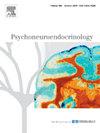Lower levels of positive affect and insomnia are associated with elevated allostatic load among Ukrainian refugees
IF 3.4
2区 医学
Q2 ENDOCRINOLOGY & METABOLISM
引用次数: 0
Abstract
To date, several biological alterations associated with the refugee status have been investigated. However, none of them has focused on the allostatic load (AL) index that is a collective measure of biological responses to stress. Therefore, the present study aimed to assess the AL index and its correlates in 60 Ukrainian refugees who migrated to Poland after the Russian invasion. The AL index was measured in 60 Ukrainian refugees and 50 controls matched for age and sex. It was based on sex-specific distributions of 15 biomarkers (cardiovascular markers, anthropometric measures, inflammatory markers, glucose homeostasis parameters, lipids, and steroids). Psychopathological symptoms and behavioral characteristics were assessed using self-reports. Refugees had significantly higher AL index together with higher scores of insomnia, negative affect, depressive and anxiety symptoms, avoidance and hyperarousal symptoms of post-traumatic stress disorder as well as lower levels of positive affect. Similarly, a lifetime exposure to traumatic stressors was significantly higher among Ukrainian refugees. Linear regression analyses demonstrated that lower levels of positive affect (interactive effects with the refugee status but not main associations) and higher levels of insomnia (interactive effects with the refugee status and main associations) were associated with elevated AL index after adjustment for age, education, cigarette smoking status, somatic disease, medication use, and head trauma history. In summary, the findings indicate systemic dysregulations of biological stress responses in Ukrainian refugees that are attributable to higher levels of insomnia and lower levels of positive affect in this population.
在乌克兰难民中,较低水平的积极影响和失眠与较高的适应负荷有关
迄今为止,已经调查了与难民地位有关的几种生物学变化。然而,他们都没有关注适应负荷(AL)指数,这是一个集体衡量生物对压力的反应。因此,本研究旨在评估俄罗斯入侵后迁移到波兰的60名乌克兰难民的AL指数及其相关因素。AL指数在60名乌克兰难民和50名年龄和性别匹配的对照组中进行了测量。该研究基于15种生物标志物的性别特异性分布(心血管标志物、人体测量、炎症标志物、葡萄糖稳态参数、脂质和类固醇)。采用自我报告评估精神病理症状和行为特征。难民的AL指数明显较高,创伤后应激障碍的失眠、消极情绪、抑郁和焦虑症状、回避和高唤醒症状得分较高,积极情绪水平较低。同样,乌克兰难民一生暴露于创伤性压力源的比例明显更高。线性回归分析表明,在调整了年龄、教育程度、吸烟状况、躯体疾病、药物使用和头部创伤史后,较低水平的积极影响(与难民身份的交互作用,但不是主要关联)和较高水平的失眠(与难民身份和主要关联的交互作用)与AL指数升高相关。总之,研究结果表明,乌克兰难民的生物应激反应系统性失调可归因于该人群中较高水平的失眠症和较低水平的积极影响。
本文章由计算机程序翻译,如有差异,请以英文原文为准。
求助全文
约1分钟内获得全文
求助全文
来源期刊

Psychoneuroendocrinology
医学-精神病学
CiteScore
7.40
自引率
8.10%
发文量
268
审稿时长
66 days
期刊介绍:
Psychoneuroendocrinology publishes papers dealing with the interrelated disciplines of psychology, neurobiology, endocrinology, immunology, neurology, and psychiatry, with an emphasis on multidisciplinary studies aiming at integrating these disciplines in terms of either basic research or clinical implications. One of the main goals is to understand how a variety of psychobiological factors interact in the expression of the stress response as it relates to the development and/or maintenance of neuropsychiatric illnesses.
 求助内容:
求助内容: 应助结果提醒方式:
应助结果提醒方式:


